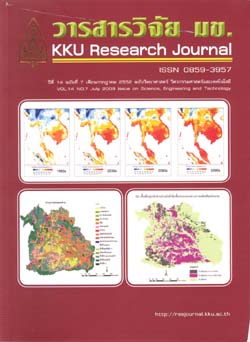Impact of climate change on water availability in Chi Basin (Thai)
Main Article Content
Abstract
Chi river basin is large river basin in northeastern region of Thailand which is major agricultural area of the country. Majority of agricultural activity in Chi river basin is rain-fed system, which is directly exposed to climate risk. Climate change from global warming effect may have impact on crop production in various aspects. Change in temperature, rainfall distribution and solar radiation could affect crop yield, however, impact of climate change on evapotranspiration of plant could alter water demand for agricultural sector, which could be driven by projected longer and warmer summertime in the river basin. This study aims to understand change in water demand to support agricultural activities in the future by study change in balance between annual precipitation and water loss from evapotranspiration under climate change scenario, ECHAM4 A2 which was downscaled using PRECIS regional climate model. The study compares change in water availability and evapotranspiration between the period of 1980-2009 (baseline) and 2010-2039 (future). The analysis based on land use and land cover of 5 mixed vegetations; rice, maize sugarcane, cassava and forest area. Results from analysis shown 3% increasing in total annual rainfall and 2% increasing of evapotranspiration and water availability will increase about 2% in a future. In conclusion, current crop production pattern and land use in the Chi river basin still be able to cope with influence of climate change, but water management may become more complicate during the dry season.


